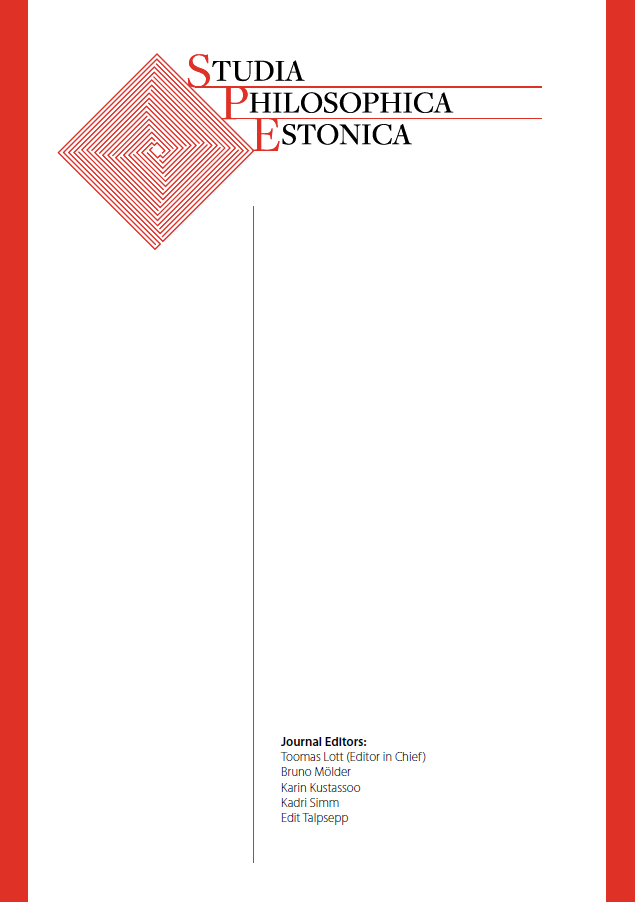A “Kantian-inspired” Argument for the Trinity
DOI:
https://doi.org/10.12697/spe.2025.18.02Keywords:
Trinity, mysterianism, apophatism, antinomy, theismAbstract
In this paper I will argue that the Trinity is part of natural theology although it is a contradictory doctrine because, even if all the “solutions” for the Trinity’s aporias are unsatisfactory, anyone wondering about the nature of God comes to think in a trinitarian way. Given this theoretical impasse (our reason should state both that God must be Triune and can not be Triune) a “Kantian-inspired Argument” allows us to still believe in the Trinity. This Argument is based on the assumption that we find antinomic situations in the ontological realm of fundamental entities and in the realm of God’s nature. This is our common way of knowing and, thus, the Trinity is a plausible metaphysical option. The Argument implies a rethinking of our metaphysics and of our religious epistemology, but it could also inspire new interesting research agendas in contemporary Philosophy of Religion.
References
Anderson, J. (2007) Paradox in Christian Theology, Eugene: Wipf and Stock.
Anderson, J. (2018) “On the Rationality of Positive Mysterianism”, International Journal of Philosophy of Religion, 83: 291–307.
Beall, JC (2021) The Contradictory Christ, Oxford: Oxford University Press.
Beall, JC (2023) Divine Contradictions, Oxford: Oxford University Press, forthcoming.
Bertini, B. (2015) “Against Trinitarian Enthusiasm”, Reportata, mondodomani.org/reportata/bertini02.htm, accessed October 11.
Bracken, J.A., Suchocki M.H. (1997) Trinity in Process, Continuum, London.
Branson, B. (2019), “No New Solutions to the Logical Problem of the Trinity”, Journal of Applied Logics, 6: 1051-1092.
Bulhof, I. N., Ten Kate, L. (2000) “Echoes of an Embarrassment: Philosophical Perspectives on Negative Theology. An Introduction”, in I. N. Bulhof, L. Ten Kate (eds.) Flight of the Gods, 1–57. New York: Fordham University Press.
Coffey, D. (1999) Deus Trinitas, Oxford: Oxford University Press.
Davis, S.T. (1983) Logic and Nature of God, Grand Rapids: Eerdmans.
Fogelin, R. (1988) “Hume and Berkeley on the Proofs of Infinite Divisibility”, The Philosophical Review, 97: 47–69. doi: 10.2307/2185099.
Guillon, J-B. (2022) “Trinity: Mysterianism and the Problem of Meaninglessnes”, TheoLogica: An International Journal for Philosophy of Religion and Philosophical Theology, 6(2): 174-205.
Griffiths, J.G. (1996) Triads and Trinity, Cardiff: Cardiff University of Wales Press.
Hasker, W. (2013) Metaphysics and the Tri-Personal God, Oxford: Oxford University Press.
Illetterati, L., Giuspoli P., Mendola G. (2010) Hegel, Rome: Carocci.
Inwagen, P. van (2022), “Richard Cartwright on Logic and the Trinity”, TheoLogica: An International Journal for Philosophy of Religion and Philosophical Theology, 6(2): 112–135.
Kilby, K. (2010) “Is an Apophatic Trinitarianism Possible?”, International Journal of Systematic Theology, 12: 65–77. doi: 10.1111/j.1468-2400.2009.00494.x
Ladyman, J. (2014) “Structural Realism”, in .N. Zalta (ed.) Stanford Encyclopedia of Philosophy. https://plato.stanford.edu/entries/structural-realism/, Accessed October 11, 2019.
Li Volsi, R. (2011) “Prefigurazioni e realtà della Trinità divina e della incarnazione del Verbo nel pensiero platonico”, Reportata, https://mondodomani.org/teologia/livolsi2011.htm, accessed October 11, 2019.
Micheletti, M. (2018) “Radical Divine Alterity and the God-World Relationship”, in D. Bertini and D. Migliorini (eds.) Relations. Ontology and Philosophy of Religion, Verona: Mimesis International, 157–70.
Migliorini, D. (2018) “Troubles with Trinitarian (Relational) Theism”, in D. Bertini and D. Migliorini (eds.) Relations. Ontology and Philosophy of Religion, Verona: Mimesis International, 181-200.
Migliorini, D. (2022a) Ontologie relazionali e metafisica trinitaria. Sussistenze, eventi e gunk, Brescia: Morcelliana.
Migliorini, D. (2022b) “Trinity and Mystery. Three Models for the Contemporary Debate in Analytic Philosophy of Religion”, Dialegesthai, 24, online.
Monaco, D. (2010) Deus Trinitas. Dio come non altro nel pensiero di Nicolò Cusano, Roma: Città Nuova.
O’Regan, C. (2011) “The Trinity in Kant, Hegel, and Schelling”, in G. Emery and M. Levering (eds.) The Oxford Handbook of the Trinity, 254–266. Oxford: Oxford University Press.
Porro, P. (2017) Tommaso d’Aquino. Un profilo storico-filosofico, Rome: Carocci.
Powell, S.M. (2001) The Trinity in German Thought. Cambridge: Cambridge University Press.
Pratt, D. (2002) Relational Deity: Hartshorne and Macquarrie on God, Lanham: University Press of America.
Priest, G., Berto, F. (2018) “Dialetheism”, in E.N. Zalta (ed.) Stanford Encyclopedia of Philosophy, https://plato.stanford.edu/entries/dialetheism/, accessed October 11, 2019.
Pugliese, M. (2011) The One, the Many, and the Trinity: Joseph A. Bracken and the Challenge of Process Metaphysics, Washington: Catholic University of America Press.
Scott, M., Citron, G. (2016) “What is Apophaticism? Ways of Talking About an Ineffable God”, European Journal for Philosophy of Religion, 8: 23–49.
Surin, K. (1986) “The Trinity and Philosophical Reflection”, Modern Theology, 2: 235–256. doi: 10.1111/j.1468-0025.1986.tb00116.x
Swinburne, R. (2013) “A posteriori Arguments for the Trinity”, Studia Neoaristotelica, 10: 13–27.
Swinburne, R. (2018) “The Social Theory of the Trinity”, Religious Studies, 54: 419–37. doi:10.1017/S0034412518000203
Taliaferro, C. (2003) “The Trinity and Natural Reason: Lessons from Cambridge Platonism”, in M.Y. Stewart (ed.) The Trinity: East/West Dialogue, 179–187. Dordrecht: Kluwer.
Tuggy, D. (2003) “The Unfinished Business of Trinitarian Theorizing”, Religious Studies, 39: 165–83. doi: 10.1017/s0034412503006437
Tuggy, D. (2019) “Trinity”, in E.N. Zalta (ed.). Stanford Encyclopedia of Philosophy, https://plato.stanford.edu/entries/trinity/, accessed October 11, 2019.
Varzi, A.C. (2007) “Sul confine tra ontologia e metafisica”, Giornale di metafisica, 29: 285–303.
Wainwright, W.J. (2009) “Theology and Mystery”, in T.P. Flint, M.C. Rea (eds.) The Oxford Handbook of Philosophical Theology, 78–102. Oxford: Oxford University Press.
Welch, C. (1953) The Trinity in Contemporary Theology, London: SCM.
Zuanazzi, G. (2005) Pensare l’Assente. Alle origini della teologia negativa, Roma: Città Nuova.





